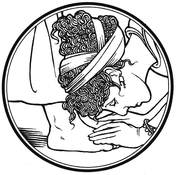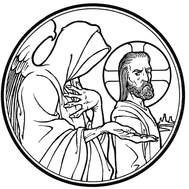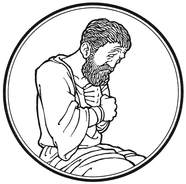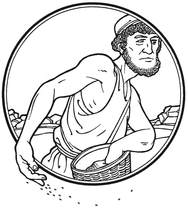From the Father's Heart Jesus moves ever closer to the cross. He had entered the holy city on Palm Sunday; now he speaks of His impending glorification. Glory will come to Jesus not in the way that princes are elevated to their thrones but by a cross which will lift up the Son of Man as the sacrifice for the sins of the world. Jesus speaks of His crucifixion as the purpose for which He came to this hour. This hour was in the mind of the Father from all eternity. So Luther’s hymn shows us the Father who beholds the misery and wretchedness of our sin “before the world’s foundation” and so there in mercy plans for my salvation. God “did not choose the easy part but gave His dearest treasure.” That treasure was and is His own Son, begotten of the Father from all eternity and born of the virgin Mary.” When God turned to you a Father’s heart, He gave you Jesus. He gave you His Son to be His Brother. When our hearts condemn us, we indeed have One who is greater than our hearts. We have God’s own heart. We have His Son crucified and raised.
0 Comments
Holding God to His Word
Jacob wrestled with God; he would not let Him go until he received a blessing from Him (Gen. 32:22–32). So it was with the Canaanite woman. Though Jesus seemed to ignore and reject her, she continued to call upon His name and look to Him for help (Mt. 15:21–28). Even when the Lord called her a little dog, she held on to Him in faith and would not let Him wriggle out of His words: “Yes, Lord, yet even the dogs eat the crumbs that fall from their masters’ table.” This Gentile woman shows herself to be a true Israelite, who struggles with God and man in Christ and prevails. “O woman, great is your faith! Be it done for you as you desire” (Mt. 15:27–28). This is the sanctifying will of God (1 Thess. 4:1–7)—to test your faith in order that it may be refined and strengthened. For tribulation produces perseverance; perseverance, character; character, hope. And hope in Christ does not disappoint (Rom. 5:1–5).
"Possessed by Sin and Bound by Death"
Do you think that you are free? After all you live in “the land of the free and the home of the brave.” Our age champions personal liberty, interpreted to mean, you can do or become anything you please-perhaps with proviso that you don’t hurt anybody or interfere with their freedom. Autonomy (literally, a law to oneself) has become one of the watchwords of our public vocabulary, especially in the area of ethics. So sexual permissiveness, abortion and euthanasia are claimed as options in the increasingly unbounded arena of personal freedoms.
Are you free? Not really. Werner Elert, a Lutheran theologian of the last century spoken of autonomy as an unfulfilled illusion. But you are free, for the Son of God Himself has freed you from the curse of the law, the darkness of death, and condemnation of Satan. You are free-you need no longer live in enslavement to self. An old hymn has us sing “Make me a captive, Lord, and then I shall be free.” And that is the wonder of our freedom in Christ. Freedom is not to be found in living as though God did not exist so that we can be who and what we will to be. Freedom is found only in Christ. Shortly before his death, Luther scribbled a few words on a scrap of paper found in his vest pocket after he died. The note read, in part: “We are beggars. It is true.” The tired, worn-out old man knew the truth that before God we can stand only as beggars, but beggars set free to live by faith in the gracious promises of a merciful God. Freedom is found only in Jesus’ words. “If you continue in my word, you are truly my disciples, and you will know the truth and the truth will set you free.”
Jesus Does Battle In Our Place
In the Garden, man exalts himself to be a god in place of God (Gen. 3:1–21). He succumbs to the temptation of the devil, and eating of the forbidden fruit, he receives death. But in the sin-cursed wilderness, God humbles Himself to become man in place of man (Mt. 4:1–11). He does not eat but fasts and bears the onslaughts of the devil for us that we may be restored to life. Jesus stands as David in our place to do battle against the Goliath, Satan (1 Samuel 17:40–51). Though outwardly Jesus appears weak, yet He comes in the name of the Lord of hosts. He draws from the five smooth stones of the books of Moses and slings the Word of God. The stone sinks into the forehead, and the enemy falls. In Christ we are victorious over the devil. Let us therefore not receive the grace of God in vain (2 Cor. 6:1–10), but seeing that we have a great High Priest, let us come boldly to the throne of grace, that we may obtain help in time of need (Heb 4:14–16).
The First Sunday in Lent is also known as Invocabit, which, in Latin, means “he will call.” This is the opening phrase of the Introit for the First Sunday in Lent: “He will call on me, and I will answer him” (Psalm 91:15a).
Remember You Are Dust.
Ash Wednesday marks the beginning of Lent, the Christian’s 40-day journey with the Lord to the cross and tomb, preparing for the proclamation of Easter. The 40 days are reminiscent of several biblical events: Jesus’ 40-day fast at the beginning of his ministry, Moses’ stay on Mount Sinai at the giving of the Law, or Elijah’s fast on his way to the mountain of God.
Ash Wednesday begins the Christian’s Lenten journey with a reminder of our mortality and a call to repentance. The ancient practice of imposing ashes on the foreheads of the faithful gives Ash Wednesday its name. The imposition of ashes has never been an exclusively Roman Catholic practice, and today is observed widely by Christians of many traditions. While the current practice of the imposition of ashes is a "modern" (since circa the ninth century) rite, the ceremonial use of ashes to express penitence has been used in the church since the first century. The church father, Tertullian (c. a.d. 160–215), writes of the use of ashes as a public expression of repentance and of our human frailty that stands in need of Christ. An actual "ash" day came into being somewhere in the eighth century, and through the past twelve centuries has developed into the current practice we observe today. The ashes remind us forcefully of our need for redeeming grace as they recall the words from the rite for Christian burial: “…earth to earth, ashes to ashes, dust to dust…,” words that will very likely be spoken over us all.
Faith Alone. The seeing are blind, while the one who is blind can see (Luke 18:31–43). Jesus tells the twelve that He is going up to Jerusalem to suffer and die and rise again, but they cannot understand or grasp what He is saying. The meaning of His words is hidden from their sight. However, as Jesus makes His way up to Jerusalem, a blind man calls out to Him for mercy. This blind man sees that Jesus is the Messiah, the Savior, for he calls Him “Son of David.” Indeed, Jesus is the Lord’s anointed, the keeper of sheep (1 Sam. 16:1–13) who goes to lay down His life for the sheep. He is the incarnate love of the Father who suffers long and is kind, who is not puffed up, who never fails us (1 Cor. 13:1–13). Jesus opens the eyes of the blind (Is. 35:3–7) to see Him not according to outward appearances of lowliness, but according to His heart of mercy and compassion. Those who behold Him thus by faith follow Him to the cross through death into life.
Scripture Alone.
The Sower sows the seed of His Word (Luke 8:4–15). This Word is living and powerful (Heb. 4:9–13) to conceive new life in those who hear it. But the planting of Christ is attacked by the devil, the world, and the flesh. Satan snatches the Word away from hard hearts. The riches and pleasures of this life choke off faith. Shallow and emotional belief withers in time of temptation and trouble. But see how Christ bears this attack for us! Christ’s cross was planted in the hard and rocky soil of Golgotha. A crown of thorns was placed upon His head. Satan and His demons hellishly hounded and devoured Him. Yet, through His dying and rising again, He destroyed these enemies of ours. Jesus is Himself the Seed which fell to the ground and died in order that it might sprout forth to new life and produce much grain. In Him, the weak are strong (2 Cor. 11:19–12:9). He is the Word of the Father which does not return void (Is. 55:10–13) but yields a harvest hundredfold.
|
Archives
February 2019
Categories
All
|
|||||||||||||||||||||||||||||||||||||||||||||||||||||||||||||||||||||

 RSS Feed
RSS Feed
